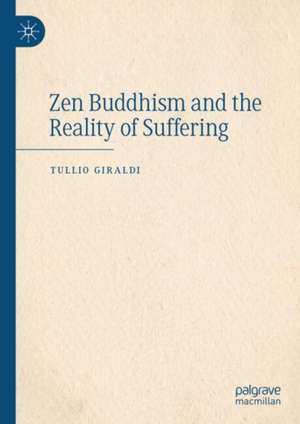Zen Buddhism and the Reality of Suffering
Autor Tullio Giraldien Limba Engleză Hardback – 21 oct 2024
Preț: 888.18 lei
Preț vechi: 1083.15 lei
-18% Nou
Puncte Express: 1332
Preț estimativ în valută:
170.01€ • 178.61$ • 142.87£
170.01€ • 178.61$ • 142.87£
Carte disponibilă
Livrare economică 18 februarie-04 martie
Preluare comenzi: 021 569.72.76
Specificații
ISBN-13: 9783031692437
ISBN-10: 3031692438
Pagini: 200
Ilustrații: Approx. 200 p.
Dimensiuni: 148 x 210 mm
Greutate: 0.36 kg
Ediția:2025
Editura: Springer International Publishing
Colecția Palgrave Macmillan
Locul publicării:Cham, Switzerland
ISBN-10: 3031692438
Pagini: 200
Ilustrații: Approx. 200 p.
Dimensiuni: 148 x 210 mm
Greutate: 0.36 kg
Ediția:2025
Editura: Springer International Publishing
Colecția Palgrave Macmillan
Locul publicării:Cham, Switzerland
Cuprins
1. Prologue.- 2. Buddhism, a religion beyond religions.- 3. Zen, beyond Buddhism.- 4. Zen moves West.- 5. Psychology discovers Zen.- 6. The mind and the natural world; Buddhism, science and the reality of reality.- 7. Science, and the natural world; The puzzle of complex non-linear and chaotic phenomena.- 8. Mindfulness East and West, cognitive therapies and biological psychiatry.- 9. Zen meditation in an open public mental health institution.- 10. Epilogue.
Notă biografică
Tullio Giraldi is full Professor of Pharmacology and Eminent Scholar at the Faculty of Medicine, University of Trieste, Italy. He is also a Visiting Professor at King's College London, UK. He remains active as a teacher and tutor at the University and Department of Mental Health of the National Health System in Trieste. Giraldi is an ordained lay Rinzai Zen monk, in the Engaku Taino and Yamada Mumon Roshi lineage. He has authored several books, over 170 articles and contributions to many international congresses.
Textul de pe ultima copertă
This book offers an accessible guide to the role that Zen has played and, alongside Buddhism, might play in both Eastern and Western attempts to alleviate mental suffering. Since its beginnings 2500 years ago, the central belief of Buddhism has been that what we perceive as “reality” is a mental representation; a religious belief which has since been substantiated by the evidence of neuroscience. The work and progress of clinical medicine, psychiatry and psychology have attempted to alleviate the sufferings of life, but the current approaches to mental health in psychiatry, the neurosciences and cognitivism don't fully address the complexity and mutual inter-relationship of the variety of factors involved in mental suffering, and its non-linear and chaotic aspects. Zen Buddhism, on the other hand, encourages access to reality, and so this book will explore, scientifically, the ways in which it’s guiding principles can be deployed to support and enhance Western, clinical solutions to mental strife.
Tullio Giraldi is full Professor of Pharmacology and Eminent Scholar at the Faculty of Medicine, University of Trieste, Italy. He is also a Visiting Professor at King's College London, UK. He remains active as a teacher and tutor at the University and Department of Mental Health of the National Health System in Trieste. Giraldi is an ordained lay Rinzai Zen monk, in the Engaku Taino and Yamada Mumon Roshi lineage. He has authored several books, over 170 articles and contributions to many international congresses.
Tullio Giraldi is full Professor of Pharmacology and Eminent Scholar at the Faculty of Medicine, University of Trieste, Italy. He is also a Visiting Professor at King's College London, UK. He remains active as a teacher and tutor at the University and Department of Mental Health of the National Health System in Trieste. Giraldi is an ordained lay Rinzai Zen monk, in the Engaku Taino and Yamada Mumon Roshi lineage. He has authored several books, over 170 articles and contributions to many international congresses.
Caracteristici
Postulates that Western approaches of psychiatry and cognitivism do not address the variety of factors involved in existential mental suffering Shows how Buddhist practices and principles might overcome the limitations of mechanistic psychiatry and CBT therapies Explores how Buddhism has played a role in both Eastern and Western attempts to alleviate mental suffering
